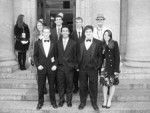Colgate’s Own Great Debaters: Colgate Now Ranked 16th in World

Colgate’s Debate Team is ranked number 16 in the world following a successful showing at the 2009 World Universities Debate Championship in Cork, Ireland over Winter Break. This places the team ahead of a number of respected institutions such as Harvard, Princeton, Stanford and St. Andrews. The accomplishment is even more noteworthy because Colgate’s team has only been in existence for five years.
Senior debater Grafton Connor described the new ranking as “putting Colgate University on the map” in the debating world.
“[It is proof] that people all over the world can turn to the liberal arts education,” Connor said. “Colgate is preparing its students to be knowledgeable and speak eloquently on any subject in the world.”
Colgate’s ranking is based on total points accumulated over the past five years of competition at the World Universities Debate Championship. This year, Colgate sent its team of eight, led by Coordinator of the Colgate Speaking Union John Adams, to compete against teams from Japan, South Africa, England, the United States and other countries. In addition to Connor, the debaters in Ireland included junior Michael Schneider, senior Stephen West, senior Jennifer Geffner, first-year Ryan Nelson, senior Arielle Dundas, sophomore Andrew Eldredge and junior Safwan Shabab.
The competition was not just an adversarial contest for its participants.
“[I’ve] formed friendships with people all over the world,” Connor said.
When the students aren’t arguing with each other before judges, they are socializing and getting to know their contemporaries from around the country and the world. Andrew Eldredge, President of the Debate Club, described the competitions as a great way to “challenge ourselves” and “go up against world class debaters.”
Moreover, Connor described debating and debate competitions as the “quintessential liberal arts activity.” The qualities that Colgate encourages most in its students, such as independent thought, careful analysis and a broad worldview, help make its debate team one of the best in the world.
During competition, debaters are divided into two-person groups that compete against three other teams in each round. The four teams are assigned a topic, such as “why we should force desegregation of Northern Irish schools,” “why adultery should be criminalized” or “why women should be taxed less than men.” Two of the teams argue in favor of the proposition, and the other two argue against it. Competitors gain points not only by out-arguing the groups on the other side of the proposition, but also by arguing more persuasively than the other group on the same side.
“After the topic is announced, debaters have fifteen minutes to work with their partners to form arguments and prepare a seven-minute speech,” Eldredge said. “Debaters are judged upon the content of their arguments, their ability to rebut other arguments, their style and their ability to fill their given role in the debate. Judges determine both individual speaker points and team points, and the teams with the highest points meet in subsequent rounds.”
According to Connor, the format of debates and the wide variety of topics rewards teams that are “passionate about knowing things,” much like the Colgate team.
Connor attributes the team’s success to a great group of debaters, and especially to Coordinator John Adams, who has imparted his knowledge of rhetoric and public speaking to the team.
Adams, however, attributes the team’s success to their “dedication and enthusiasm.”
“They love what they do, they spend time doing it and they keep getting better,” Adams said. “[They have a] wonderful thing going.”
The Debate Team currently has thirty active members. While debating requires students to be able to “think on their toes,” according to Connor, new members can become successful quickly. The team hopes to recruit even more members before they participate in a national competition later this semester in Vermont.
The team is also planning showcase debates on campus where members will debate “hot topics.” The debates will give the community a chance to see what debating is all about, and how debating really does, as Connor says, “take the liberal arts education and put it to use.”






